
Matthew 26:17, Eat the Passover.
When did the disciples keep the Passover or the last super?Since Yeshua had to be hanging on the cross during the time that the Jews were offering the Passover lamb in the Temple, which was the same time that ancient Israel was killing their Passover lamb, it seems impossible that Yeshua could keep Passover with his disciples at this exact time. Yet Scripture mandates that Passover be kept on the fourteenth day of the first month. How do we resolve this difficulty?
Let’s look at some scriptures relating to this subject:
- Matthew 26:17 reads, “Now the first of the unleavened bread the disciples came to Yeshua, saying unto him, Where do you want us to prepare for you to eat the Passover?” (italicized supplied words not in the original Greek have been removed). Mark 14:12 reads the same.
- Luke’s account says, “Then came the day of Unleavened Bread, when the Passover must be killed” (22:7).
The Scripture shows us that in the Gospel narrative the terms “Unleavened Bread” and “Passover” are synonymous and interchangeable (Luke 22:1). Furthermore, we see that the “Passover [lamb] was killed on the Day of Unleavened Bread” (Luke 22:7). In a strict letter-of-law Torah sense, this is impossible since Passover and Unleavened Bread were two separate appointed times falling on two separate days, though the days were adjoining each other. In the Gospel accounts, however, the writers use the colloquial term Passover to designate both appointed times—a common practice in the first century.
The Gospels further tell us that Yeshua commanded his disciples to go and prepare a place to keep Passover (Luke 22:8). The disciples asked Yeshua where to go to prepare for it (Luke 22:9). Yeshua reiterates that he will be eating the Passover meal with them (Luke 22:11). The disciples make the room ready for the Passover meal (Luke 22:13). And finally, Yeshua calls this meal the Passover. He tells his disciples in Luke 22:15, “With desire I have desired to eat this Passover with you before I suffer.” (Mark and Matthew’s accounts of these events corroborate this.) The word Passover (pascha, Strong’s G3957) in the Greek can refer to the Passover day, Passover meal or the Passover lamb. The context in which the word is used has to determine which one of its several meanings is applicable here. It seems that the context here would point to a meal.
John 13:2–30 offers further proof that the Passover meal that Yeshua was doing was not at the end of the fourteenth and the beginning of the fifteenth, which would have made it the evening of the Sabbath (Heb. erev Shabbat)—in this case, the high Sabbath or the first day of the Feast of Unleavened Bread. When Judas left the supper (verse 27), the disciples figured that he was departing to purchase more supplies for the Passover meal, which was yet to come (verse 29). Furthermore, for them to think this means that they knew that the shops were open from which to buy supplies (and therefore it was not the Sabbath or Shabbat). This would not have been the case had the last supper been at the end of the Passover as it was approaching the beginning of the fifteenth, which was still 24 hours off.
Since Yeshua could not partake of the Passover meal on the afternoon of the fourteenth, and since the Gospels tells us that it was evening when he celebrated Passover with his disciples, and since we know it occurred on the fourteenth of the month of the abib, when was the Lord’s supper or last supper? It had to have been at the end of the thirteenth and at the beginning of the fourteenth after sundown. They simply kept it earlier on the same day (at the beginning of the fourteenth rather than at the end). At the end of that same day, he was hanging on the cross as the Passover Lamb. After the Lord’s supper Yeshua and his disciples went to the Garden of Gethsemane where he was arrested by the Jewish leaders later that night. During the evening and into the morning he was put on trial before the Jewish leaders and afterwards he stood before Pilate, after which he was nailed to the cross sometime between the third and sixth hour (according to the Gospel accounts). At 3 p.m. (Luke 23:44-46), he proclaimed the famous words: “Eloi, Eloi …” and shortly after that exclaimed, “Father receive my spirit …” whereupon he died.
Did Yeshua celebrate an actual Passover service or was it simply a memorial dinner, or a fellowship meal often referred to as the Lord’s supper? There are valid arguments on each side of this issue. Perhaps it doesn’t really matter. For us now, the big question is how could Yeshua keep the Passover (as he said he did) with his disciples on the fourteenth of Abib as Torah commands and still be hanging on the cross on the same day as the spiritual fulfillment of the Passover Lamb?
The Gospel accounts are clear about the fact that Yeshua was keeping a “Passover” meal, for he says so, yet we have seen that it had to have been an early meal on the same day. It was not the main meal that was to be held later at the end of the fourteenth into the fifteenth of Abib as the Torah instructs in Exodus chapter 12.
Alternative “Passovers”
What was the precedence for such a meal? Does Torah make allowances for another Passover celebration at another time? The answer is yes.
Continue reading
